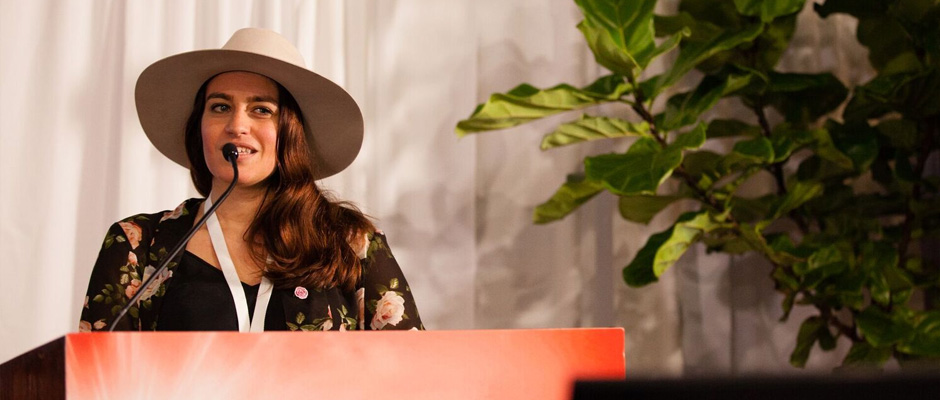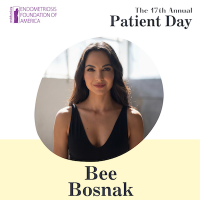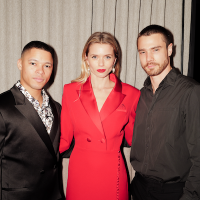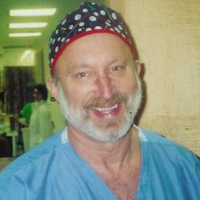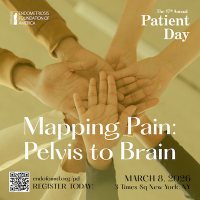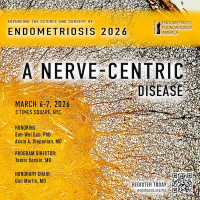PATIENT AWARENESS DAY 2018:
LIVING YOUR BEST LIFE WITH ENDO
Sunday, March 18, 2018, (8am-5pm) Einhorn Auditorium (131 E76th st) at Lenox Hill Hospital, NYC
Eating for Endometriosis
- Hi. So I want to say that I have no idea what is being served for lunch, so... anything I say, we can get started tomorrow so there's no judgment in terms of what you have for lunch today, but, so, I also wanted to say this would be the most inappropriate thing to say at any other talk, but because we're here for endo, I want to tell you that this is my second day of my period right now, and I'm standing up here giving a presentation, and my eyes are wide open, and so much of that is because of food and the tools that I use to manage my endo, and I think that all the things that were talking about today, I think surgery is so important, but after that, it's the tools that you use to help manage day to day. So we're gonna talk about food today and... Oops.
Okay, so who here has heard about an endo diet? Yes, okay. Who here knows what that means? Okay, way less hands. I think that you see the endo diet everywhere. You see it on blogs. You see it on websites. You see it on Instagram, but no one exactly knows what it means because some people say its plant based. Some people say it's paleo. Some people say it's vegan. Some people say that eggs are the devil, and other people say they're cool. Some people say that you shouldn't drink coffee, and other people say that two cups a day are great, and then cheese is the thing that always comes up. It's like, "Well, but I have to eat cheese, "so how am I gonna do this?" So you explore, and you think that you kind of understand what it is and you totally have it, and then you get so excited to go to your doctor, and you tell them, "Okay, I've done all this research. "I found how great diet is. "It's going to help my endo," and then your doctor tells you that diet has no affect on endometriosis, and this is usually how... And you do not understand how many e-mails and messages I get from women that say, "So I researched. "I read your book. "I did all of this investigation, "and my doctor says that diet has no effect "on endometriosis," and I think that that's wrong because I think that diet does matter. I think it 100% matters. So let's just talk about this for a second. So when a woman with endometriosis has her period, she has bleeding not only from the cells and tissue inside the uterus but can also have bleeding from the cells and tissue outside the uterus. When blood touches these other organs, especially inside the abdomen, it can cause inflammation and irritation, creating pain. So let's have that word "inflammation" in our head. So doctors, nutritionists, Instagram experts on food, they have debated what the best diet is for our bodies, whether you have an illness or not, and I'm sure that you guys have seen there's so many diets out there that it gets really confusing what the best diet is, and they debate it, and they research it, but the one thing that everyone agrees on is that inflammatory foods are not our friends. So that's the one thing that everyone agrees on. So then, we go back to that other slide, where we know that endometriosis is an inflammatory disease, so how could an anti-inflammatory diet not help us? That just doesn't make sense, right, because if you're eating inflammatory foods, it's only gonna add fuel to the fire if you have an inflammatory disease. So what are inflammatory foods? Again, this is not a judgment if all of your favorite foods are on here. We're just talking about or identifying what they are and go from there. So processed and packaged foods, dairy products, milk, cheese, yogurt, red meat, soy, fried foods, soda, carbohydrates and wheat, alcohol, caffeine, are some of these your favorite foods? Yes? Okay. This is the part that's like a mind blower is that some people also experience inflammation and pain from eggs, nuts, grains, corn, nightshade vegetables, which are eggplant, peppers, tomatoes, and potatoes. So what the F are we supposed to eat? Like seriously, what are we supposed to eat because I think I just named off every type of food that there is. Well, I think the best place to start, and I don't think that you always have to stay here, but I think that when we're talking about changing our diet for endometriosis, a really good starting point is a whole food plant-based diet, and I'm not saying that you have to stay here forever, but I think what we need to do for a lot of our bodies is at least create a baseline to see what foods that we react to and what foods are triggers of inflammation in our body. So what is a whole foods plant-based diet? Whole foods are foods that are minimally processed or not processed at all, so those are veggies, fruits, nuts, seeds, grains, and legumes, and "plant-based" means that these foods come from the ground and the trees and are not derived from animals. So there's a lot of plant-based people that eat honey, myself included. Yes, it comes from an animal, but I think that's fine. So that leads you to the question, "Why don't you just say vegan?" Well, fried Oreos are vegan, and I think we all know that those probably aren't the best thing for our diet, and I think that, you know, one thing that my friend Demara always says is that if the word "vegan" was above the apple section of the grocery store no one would ever buy an apple again because there's so much that goes into that word vegan. It's political. A lot of people are vegan because of ethical reasons or environmental reasons, but we're eating for our bodies to feel good, and I think that that's the best place to start. I also think that when we put labels on ourselves, if we call ourselves, like decide today, after today you go home and you tell your family, "I'm gonna be vegan," and then you go to a birthday party, and they see you eating a piece of pizza, and they say, "I thought you said you were vegan," and then all of a sudden, you feel like that you failed, and I think that this is why I love that phrase "plant based" so much is because it gives you some room to breathe, and it gives you room to experiment and see what works for you without everyone else judging what you're doing because I don't know about you guys, but for some reason, people really care about what we eat for some reason, and I don't know why. It's like when you decide to go plant-based, all of a sudden everyone says, "Well, are you getting enough protein?" When they could care less about how much protein you ate before. So what about gluten? This is the tricky one because I think that you hear studies saying that gluten is great for you. You hear studies saying that gluten is the devil, and where I think you fall is what your body feels. I do think that it's important the quality of the gluten that we're eating, so if you're eating really crappy Wonder Bread, that's gonna be really different than eating a really great piece of sourdough that's been fermented and has really great grains in it, but I do think that as we switch our diets, it is important to at least test the waters with the gluten-free thing, just to kind of see how it makes your body feel because a lot of people do have a sensitivity to gluten, even if you don't have celiac. So I do think it's important to play around with and see how it makes your body feel because I know personally when I eat gluten, I mean, I have a lot of bathroom issues, and I think that women with endometriosis tend to have some GI issues in general, so... I mean, do you guys feel like... Raise your hand if you have gluten... Okay, but you keep eating it, right? Yeah, okay. So I think it's important to see what works for you, and I think that, you know, trying the whole foods plant-based without the gluten just to start, and then you can kinda slowly introduce foods and see what works for you, but if you're eating a sandwich that has bread, meat, cheese, and you feel sick, how are you supposed to know if it was the bread, the meat, or the cheese? So it's really important to create a baseline. So, "What am I supposed to eat?" That's like the biggest question, and also, "I don't cook." This is the thing that I hear the most from people is, "I don't cook." First of all, there's a lot of things that you can eat. There is an amazing amount of cookbooks, and if you want see e-mail me, they're on my website. I have a lot of great sources. Oh, I have a book that it's out there if you want to check it out, too. There's a lot of things that you can eat. You can eat plant-based lasagna. You can make soups. You can make stews. You can have tacos. There's amazing things, and I think the way that I started to change my diet was I identified all the things that I loved, and I figured out how to make them in a way that I could eat because I don't think that anyone should walk out of here and feel that they have to now eat steamed broccoli and brown rice and that's it. Like, that's not what it's about. It's still eating foods that you love, and then the whole not being able to cook thing, that's the one thing that I don't give anyone a pass on because I did not cook ever. Whenever I would make rice, I would either, when the time was up, it would either be sitting in a pool of water, or it would be burned onto the bottom. It was never like right, but you have to practice, and I think the fact that you're here today means that you care. So if you say that you can't cook, go home and try, and then keep on trying until it works. It just takes practice like most things in our life. Does anyone still feel like they can't cook even though I'm saying this? Okay, everyone's willing to try. So I think... I just recently did an endo toolkit course. Who's here from that course? Is there any... Yeah, okay, hi everyone, and the one thing that kept on coming up in our course, and I think some things that we're talking about today, is that change can be very uncomfortable. Changing your diet was one of the hardest things I've ever done in my entire life. I thought that I would no longer enjoy any of my family traditions. I couldn't go out with my friends to pizza night, and I just felt really isolated and alone, and that was a really uncomfortable feeling, and just the judgment, too, from outside, but the thing about it is is like this is making you feel better, and although that might make other people feel uncomfortable, it doesn't matter what they think. So all of these things that we're talking about today, they might be really uncomfortable to start trying, but you have to start trying them if you want to feel better. So this is one of my very favorite quotes from Dr. Mark Hyman is that, "Food is not just calories or energy. "Food contains information that speaks to your genes," but I like to revamp that and say that food is not just calories or energy. Food contains information that speaks to your endo. So one thing that I do is when I take a bite of food, I actually think, or when I'm making meal choices, I think, "How will this affect my endo today? "How will this affect my endo tomorrow? "Will it piss it off, or will it make it happy?" And I'm telling you, the days leading up to my period, I don't want to piss my endo off, so I feed it good stuff, and I don't think that this type of diet that you have to be perfect all the time, but I think it's about thinking getting out of bed in the morning because this is not a cure. We all know that there is no cure for endo, but what if it means that you can get out of bed in the morning, or you can go to work, or you can actually be with your family? I think it's worth making that change. So does this feel like it's... It's a lot. It's too much, but I think the key is to take one part at a time, and one of my philosophies is to start with at least one plant-based meal a day. You don't have to tomorrow say, "Okay, I'm gonna do this plant-based weighing 100%." Start with one meal, and the next week start with two, and the next week start with three, and just really ease into it to see how these changes make you feel. I think the second thing is being mindful of triggers of your endo before and during your period. If you notice that eating that fried Oreo makes you feel like crap, well, like, think about if it's worth it or not because I really do feel like this food speaks to our endo, and then ease into a change that you actually like. So again, going back to that steamed the broccoli and brown rice, that sounds like the most boring dish ever, but what if you could add more vegetables, and you could make a really good spicy curry sauce that you'd throw on top of it? You don't have to be sentenced to a whole bunch of stuff that you don't want to eat. You can make change that you actually enjoy, and it's crazy because the things that I eat now are things that I thought were disgusting five years ago, and now, they are things that make me so happy. So it is possible. So this is, you know, we went from that first, and this is kind of how I envision you guys cooking in the kitchen after. So you can find me in all of these places. We have a Know Your Endo magazine that comes out once a month. I have a podcast and then a cookbook. All of the recipes in the cookbook are endo friendly, and I just think you should get started at least with one meal a day today or tomorrow. Okay, thank you.



